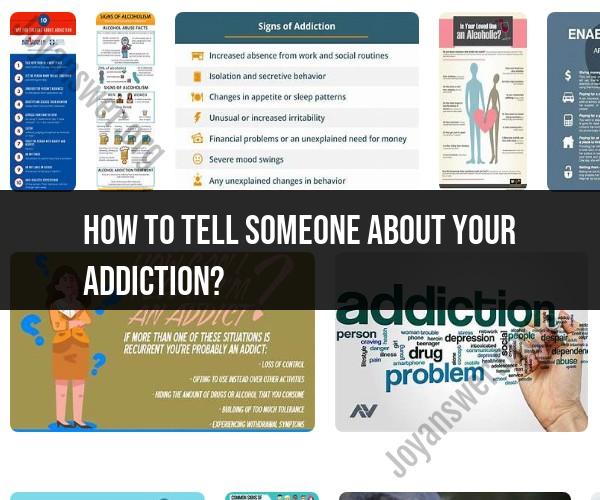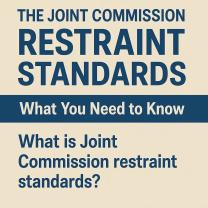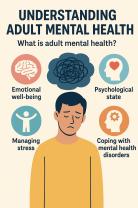How to tell someone about your addiction?
Telling someone about your addiction can be a difficult and emotionally charged conversation. However, it's an essential step in seeking support and getting on the path to recovery. Here are some steps to consider when talking to someone about your addiction:
Choose the Right Person: Decide who you want to confide in. It could be a trusted friend, family member, a healthcare professional, or a support group. Consider their understanding of addiction and their ability to provide support.
Pick the Right Time and Place: Find a quiet, private, and comfortable setting where you can talk openly without distractions or interruptions. Ensure that you have enough time for the conversation.
Be Prepared: Before the conversation, educate yourself about your addiction and its effects. Understand your reasons for wanting to share your struggle and what kind of support you're looking for.
Be Honest: Open the conversation by being honest about your addiction. Use "I" statements to express your feelings and experiences. For example, "I have been struggling with addiction to [substance/behavior]."
Share Your Feelings: Explain how your addiction has affected you emotionally, physically, and socially. Share your fears and concerns, as well as your hopes for the future.
Offer Information: Provide information about the addiction itself, such as how it works, its potential consequences, and the treatment options you're considering.
Be Prepared for Reactions: Understand that the person you're talking to may react with a range of emotions, including shock, anger, sadness, or disbelief. Be patient and empathetic, as their response may be a reflection of their own fears and concerns.
Express Your Desire for Help: Make it clear that you're sharing your struggle because you want support and help in overcoming your addiction. You can specify the type of support you're looking for, whether it's emotional, logistical, or assistance in finding treatment.
Set Boundaries: If necessary, establish boundaries regarding their involvement in your recovery. Be clear about what you expect from them and what you're capable of handling on your own.
Listen Actively: After sharing your story, encourage the other person to share their thoughts and feelings. Active listening can strengthen the conversation and foster understanding.
Consider Professional Help: Depending on the severity of your addiction, you may need to seek professional help. A healthcare provider or addiction counselor can guide you through the process and assist in involving loved ones.
Stay Committed: Recovery is a journey, and it's essential to stay committed to your goals. Continue seeking support, whether it's from a therapist, support group, or other resources.
Remember that talking about your addiction is a significant step toward recovery, and it takes courage to share your struggles. It's also important to maintain open and honest communication as you work through the recovery process. Building a support network and seeking professional help can be valuable in your journey toward overcoming addiction.
Discussing Your Addiction: Strategies for Effective Communication
When discussing your addiction with others, it is important to be honest, open, and respectful. Here are some strategies for effective communication:
- Choose a time and place where you can have a private conversation.
- Start by telling the person that you care about them and that you want to share something important with them.
- Be honest about your addiction and the impact it has had on your life.
- Avoid blaming or making excuses for your behavior.
- Instead, focus on your commitment to recovery and your need for support.
- Be prepared to answer questions and to listen to the other person's concerns.
Opening Up About Your Addiction: Who to Talk to and When
The decision of who to talk to about your addiction and when to do it is a personal one. There is no right or wrong answer. However, it is important to choose people who are supportive and who you trust.
Some people you may want to talk to about your addiction include:
- A close friend or family member
- A therapist or counselor
- A support group for people with addiction
It is also important to consider the timing of your disclosure. You may want to wait until you have made some progress in your recovery before talking to others about your addiction. This will give you a chance to feel more confident and prepared.
Sharing Your Addiction Story: Honesty, Empathy, and Support
When sharing your addiction story, it is important to be honest and open. However, it is also important to be empathetic and respectful of the other person's feelings.
Here are some tips for sharing your addiction story:
- Focus on your own personal experience. Avoid making generalizations about people with addiction.
- Be honest about the challenges you have faced, but also share your successes.
- Talk about the impact addiction has had on your life, but also focus on your hope for the future.
- Be respectful of the other person's feelings. If they seem overwhelmed, take a break or stop talking altogether.
Seeking Professional Help and Guidance for Addiction Disclosure
If you are struggling to decide who to talk to about your addiction or how to do it, you may want to seek professional help and guidance. A therapist or counselor can provide you with support and guidance throughout the disclosure process.
Rebuilding Relationships and Trust After Sharing Your Addiction
Sharing your addiction with others can be a difficult experience, but it can also be a powerful step towards rebuilding relationships and trust.
Here are some tips for rebuilding relationships and trust after sharing your addiction:
- Be patient. It takes time to rebuild trust.
- Be honest and open about your recovery journey.
- Be accountable for your actions.
- Keep your commitments.
- Be supportive of the other person.
Remember, you are not alone. There are many people who care about you and want to support you in your recovery.












